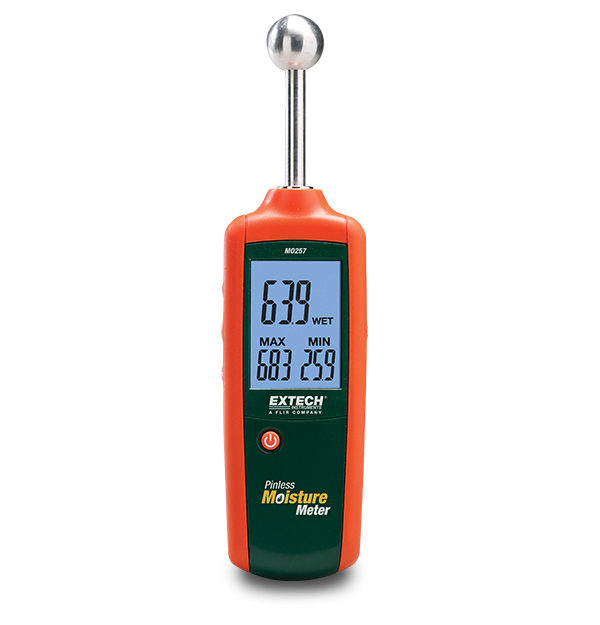The Science Behind Moisture Meters: How They Function and Why They're Essential
The Science Behind Moisture Meters: How They Function and Why They're Essential
Blog Article
The Ultimate Guide to Moisture Meters: A Comprehensive Summary and How They Can Conserve You Cash
In the world of structure maintenance, building, and various industries, the relevance of accurately gauging dampness levels can not be overstated. Dampness meters work as vital devices in finding and keeping an eye on moisture material in materials, assisting in stopping expensive damages and making certain the high quality of products. Recognizing the nuances of various sorts of moisture meters, their applications, and the possible cost-saving benefits they provide can be a game-changer for companies and specialists alike. Uncovering exactly how these devices can not just improve procedures however also add to financial cost savings is a journey worth getting started on.
Sorts Of Moisture Meters
Various kinds of moisture meters are offered for different applications in different sectors. One common kind is the pin-type moisture meter, which determines the electrical resistance in between two pins put into a material. This type is ideal for wood, drywall, and various other structure materials. Pinless moisture meters, on the various other hand, usage electromagnetic sensing unit plates to check a larger location without causing damage to the product's surface area. These meters are optimal for promptly evaluating dampness levels in large areas such as wall surfaces and floors.
In addition, there are additionally specialized wetness meters made for certain products like dirt, hay, or grain. These meters offer precise dampness readings tailored to the distinct properties of the material being tested. Infrared moisture meters determine the thermal residential properties of a product to establish its dampness web content non-invasively, making them valuable for applications where pin or pinless meters might not be suitable. Understanding the different types of moisture meters readily available can aid industries choose the most appropriate device for their details dampness dimension demands.

Benefits of Using Moisture Meters

Moreover, making use of moisture meters can cause raised energy efficiency. By determining locations with high moisture degrees, such as leakages or inadequate insulation, adjustments can be made to improve energy conservation and decrease utility prices. In farming settings, moisture meters play an important function in optimizing plant returns by making it possible for farmers to check dirt moisture levels and make notified watering choices. Generally, the advantages of making use of dampness meters extend throughout various straight from the source industries, providing affordable services and promoting better quality assurance techniques.
Exactly How to Pick the Right Moisture Meter
Choosing the suitable moisture meter entails taking into consideration crucial aspects such as material compatibility, dimension variety, and calibration precision. When picking a moisture meter, it's vital to ensure that the meter appropriates for the specific product you will be testing. Various products have varying electric buildings that can impact moisture readings, so picking a meter created for your material is critical for precise outcomes. Furthermore, consider the dimension series of the moisture meter. Make sure that the meter can spot dampness levels within the array required for your applications. Calibration precision is another essential element to remember (Moisture Meter). Choose a moisture meter with dependable calibration to make sure accurate and regular analyses. Some meters may need periodic calibration changes, so understanding the calibration procedure is important. By very carefully evaluating these aspects, you hop over to here can choose a wetness meter that satisfies your requirements and gives precise moisture measurements for your tasks.
Correct Strategies for Moisture Meter Use
To make sure accurate dampness readings and make best use of the efficiency of a moisture meter, using correct methods is important. When making use of a pin-type wetness meter, insert the pins or probes right into the material being examined up until they make complete call. By adhering to these proper strategies, individuals can rely on their dampness meter to offer reliable wetness degrees, aiding in preventing pricey damage or making certain quality in numerous applications.

Cost Financial Savings With Moisture Meter Applications
How can the calculated usage of dampness meters lead to substantial cost savings across different markets? In the farming sector, moisture meters help in establishing the optimum time for harvesting crops, avoiding over-drying or excess wetness that can influence the last item's top quality.

Additionally, in the food processing market, wetness meters are crucial for monitoring item top quality and ensuring compliance with safety policies. By accurately measuring moisture content in food, manufacturers can prevent spoilage, maintain quality, and lower waste, causing substantial expense savings. In general, the strategic application of moisture meters is a beneficial financial investment that can bring about great post to read considerable expense reductions and improved performance throughout different industries.
Conclusion
In verdict, wetness meters are beneficial tools for identifying and determining wetness degrees in different products. By utilizing the ideal dampness meter and following appropriate strategies, users can successfully stop expensive damages triggered by excess moisture.
Dampness meters serve as essential tools in finding and checking moisture material in products, assisting in preventing costly damages and making sure the top quality of items. Infrared dampness meters measure the thermal buildings of a product to determine its moisture content non-invasively, making them helpful for applications where pin or pinless meters may not be appropriate.Moisture meters provide vital benefits in properly monitoring and assessing moisture levels in diverse materials and environments. In farming setups, dampness meters play a critical duty in maximizing plant returns by making it possible for farmers to check dirt wetness levels and make informed irrigation choices.In verdict, wetness meters are useful devices for determining and discovering moisture degrees in numerous products.
Report this page